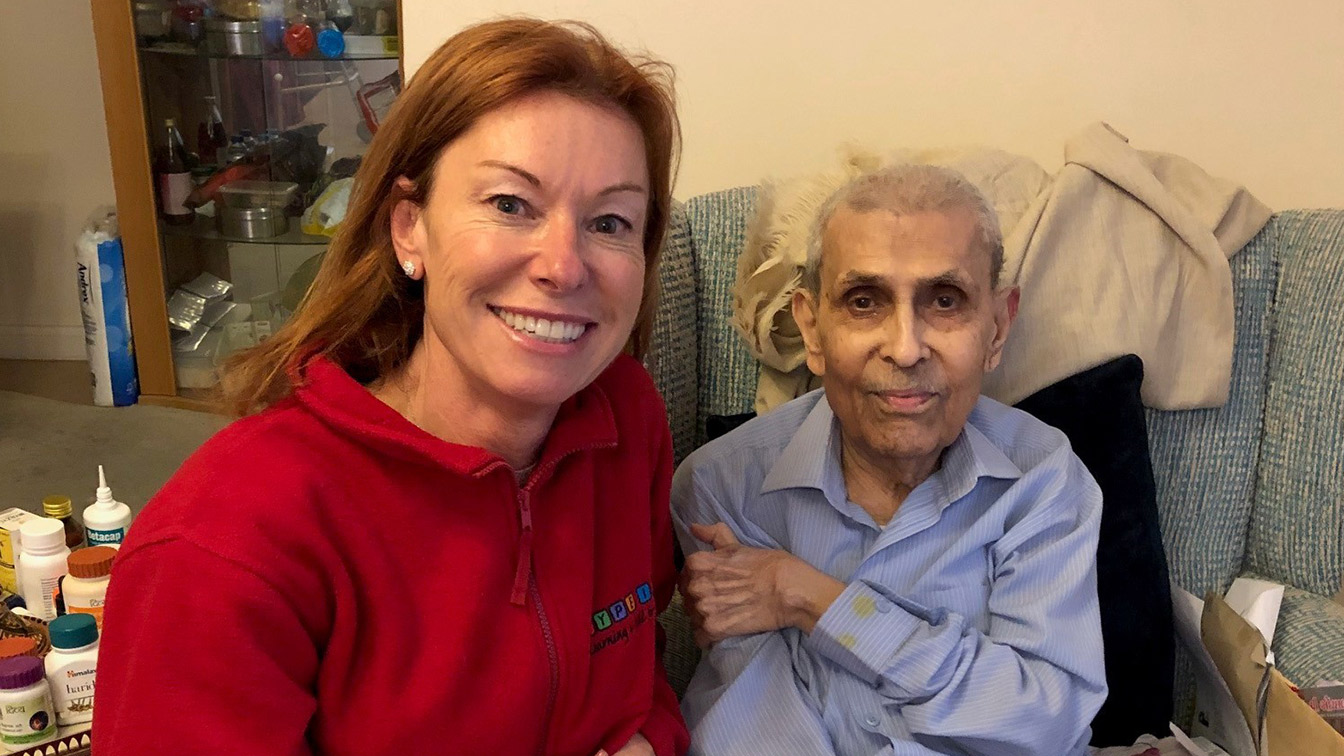
Out of the slums of Bombay
I was contacted by a gentleman called Kotak after the story about my Donate4Dharavi Charity Run on 6th January 2019 was published in the Gujarat Samachar newspaper in the UK. He was keen to find out how he could donate money to the charity and during the conversation he mentioned that he used to live in Dharavi as a young child. Now living in the UK just a few miles away from me, I arranged to meet up with him as I felt he had an amazing story to tell. Here is his inspiring story…
Wendy Petersen.
OUT OF THE SLUMS OF BOMBAY
Manubhai Kotak, or Kotak as he likes to be called, was born in 1933 in Morvi, India, a municipality in the Indian state of Gujarat. When he was just 6 months old, his mum and dad came to Bombay where his father set up a general store or rations shop, as it was known, selling rice, grains and household goods in Dharavi. The exact location is unknown but Kotak knows that the area was inhabited by the Koli community and the fishermen and women worked in the fish market just behind their shop. Times were hard and the young couple and baby Kotak slept in a room at the back of the shop.
In 1936, when Kotak was just 3 years old, his mother died, aged just 30 years old. She died of typhoid, where at the time there was no known cure. His grandmother came to live with them for a few years to help to bring up the boy and his younger sister, Sharda. During this time, Kotak attended a school in Mathunga just south of Dharavi. Everyday his Dad would cycle his tiffin box lunch to him at school.
In 1944 when Kotak was 11 years old, there was a huge blast in in the Victoria Dock of Bombay when the freighter SS Fort Stikine, carrying a mixed cargo of cotton bales, gold and ammunition including around 1,400 tons of explosives, caught fire and was destroyed in two giant blasts, scattering debris, sinking surrounding ships and setting fire to the area, killing around 800 to 1,300 people. Some 80,000 people were made homeless. Kotak explained that at school everything was shaking so much, people thought it was an earthquake.
Unfortunately the devastation in the city meant that the local economy went into decline and the family business suffered. Kotak’s father decided to close his business and move back to Morvi, where Kotak was originally born and where some of his extended family lived.
Unfortunately this proved difficult for the family as the business did not do well here either. The area was just too quiet and customers were few and far between. So after a couple of years his father decided to move back to Bombay in the Lower Parel area, just south of Dharavi. At the time, this area was well known for its cotton mills due to it’s 300 lakes in the area which were perfect for coal-powered mills needing an abundant supply of water. Kotak’s father had previously worked at one of the cotton mills and had a lot of contacts still there that helped him find new premises for a shop.
It was a very small shop that they rented, but with no accommodation that came with it and life again was very hard for the family. Without anywhere to sleep, the landlord built them a tiny wooden covered awning at the front of the shop in the road, where the family slept on blankets at night. They tolerated these conditions for about 8 months until Kotak’s maternal uncle offered the boy and his sister a roof over their heads. After staying with their uncle for a year, both children were sent to separate boarding schools. Kotak went to a well respected boarding school in Jamnagar where he passed his Matriculation exam. It cost a lot of money to be educated at this private school and Kotak is forever grateful to his uncle for helping him.
In 1950 after finishing his education, Kotak returned back to Bombay where his struggle to find accommodation continued. Thankfully his father’s sister’s son had a furniture shop and in the evening he would stay in the basement storeroom whilst helping in the shop.
In 1953, aged 20 years old, he got engaged to his now wife, Sushila. Kotak had a huge family wedding attended by many in the community and started his married life in a very small and modest 10 x 10 ft rented room in the Bombay suburbs. But disaster struck again because as soon as they married, he became unemployed once again and the young couple struggled financially. The time had come to take action and with no work and no money, Kotak left India for Uganda. Rather than see getting married as a negative, Kotak explained that Sushila was his good luck charm, opening up the opportunity to him to start a new life for them both in Uganda.
At this time Uganda was a protectorate of the British Empire which lasted from 1894 to 1962. In 1893 the Imperial British East Africa Company transferred its administration rights of territory to the British Government. Under this administration, Kotak was given a work permit to work in the judicial department as an interpreter. This was a job he loved and worked at for 18 years. Kotak’s cousin in Uganda always told him that to get far in life it was important to learn English so without television in those days, the family would sit listening to the BBC news on the radio every evening for half an hour. That’s how Kotak learnt such impeccable English!
In early August 1972, the President of Uganda, Idi Amin, ordered the expulsion of his country’s South Asian minority, giving them 90 days to leave the country. At the time of the expulsion, there were approximately 80,000 individuals of South Asian descent (mostly Gujaratis in Uganda, of whom 23,000 had had their applications for citizenship both processed and accepted. Although the latter were ultimately exempted from the expulsion, many chose to leave voluntarily. The expulsion took place against a backdrop of Indophobian Uganda, with Amin accusing a minority of the Asian population of disloyalty, non-integration and commercial malpractice, claims Indian leaders disputed. Amin defended the expulsion by arguing that he was “giving Uganda back to ethnic Ugandans”.
After 18 wonderful years living and working in Uganda, aged 39, Kotak was forced to flee. Because Uganda was a British Protectorate, Kotak was given a free air ticket by the British Government to fly to the UK where his younger sister had settled some two years before from Kenya. On arrival in the UK, his wife and young family were sent to an Army camp in East London where some 300 people lived in pretty grim conditions.
By now, Kotak had 3 young children (two daughters and a son) and this was not the way he wanted to start his new life in the UK. So Kotak decided to move his family out of the army camp and went to live temporarily with his sister. All he had in his pocket when he left the camp was the £5 they had given him.
His sister helped him find accommodation in Forest Gate, East London and his brother in law helped him to find his first job as a credit controller. Soon after, Kotak decided to send for his father from India. However with just a rented 3-roomed house and with one of those rooms being completely damp and uninhabitable, the large family had to live and sleep in just 2 rooms. After 6 months, it was decided that it was better, for his father’s health, to return to India.
Kotak still had good friends in the Ugandan Judicial System and over the years that he worked there, Kotak had accumulated some significant savings. He asked one of his ex-colleagues whether it would be possible to send over his £1200 savings which then duly arrived. Using this money as a deposit, Kotak was able to buy his very first home in the UK – a terraced house which cost £11,500. His family were now on their way to becoming financially secure and finally settled!
Kotak took on a number of jobs in the UK over the years including working eight years for the Road Transport Industry until he was made redundant when the government closed it down. In 1985, Kotak started work as an Immigration Interpreter at Heathrow Airport. This was a job that he thoroughly enjoyed, helping people to communicate in Gujarati and Hindi. This was Kotak’s last job where he retired from the job aged 64.
Kotak reflects on his life saying that he owes everything to his family and in particular his uncle and cousin brother for helping him in education, finding work and accommodation. He did have a tough start in life but Kotak says that you just have to face the situation you are in and deal with it. His advice for a child growing up in Dharavi would be to work hard in order to find success and learn the importance of money.
Kotak is now 86 years old, living in Pinner, North West London with his wife in a small apartment. He is not in the best of health, is registered disabled and lives in a ground floor apartment so he can be a little more mobile. He also owns a large house in the local area which his son and his family live in. Until a recent knee injury, Kotak and his wife enjoyed annual visits to the family home in Mumbai. Kotak and his wife Sushila have the support of a very close family – two daughters and a son who live close by. They have six grandchildren – three boys and three girls. His sister Sharda lives just down the road in Stanmore.
“Life is about family – a joint effort, helping each other to become successful” Manubhai Kotak
22nd January 2019

